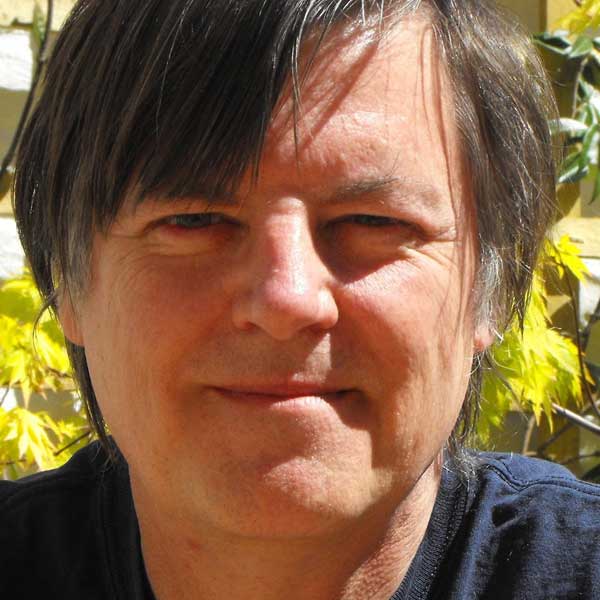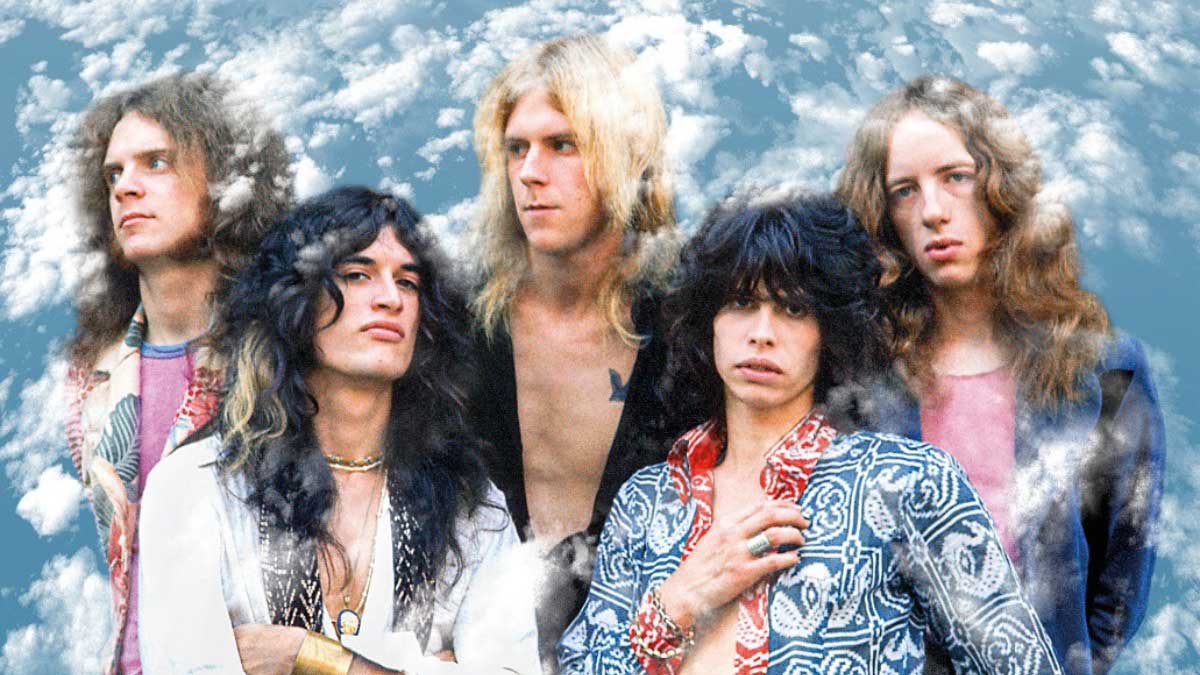When Pink Floyd reunited for Live 8: "It was like sleeping with your ex-wife"
Pink Floyd’s classic line-up reunited only once, to play the historic Live 8 charity concert in 2005. Just don’t ask them to do it again
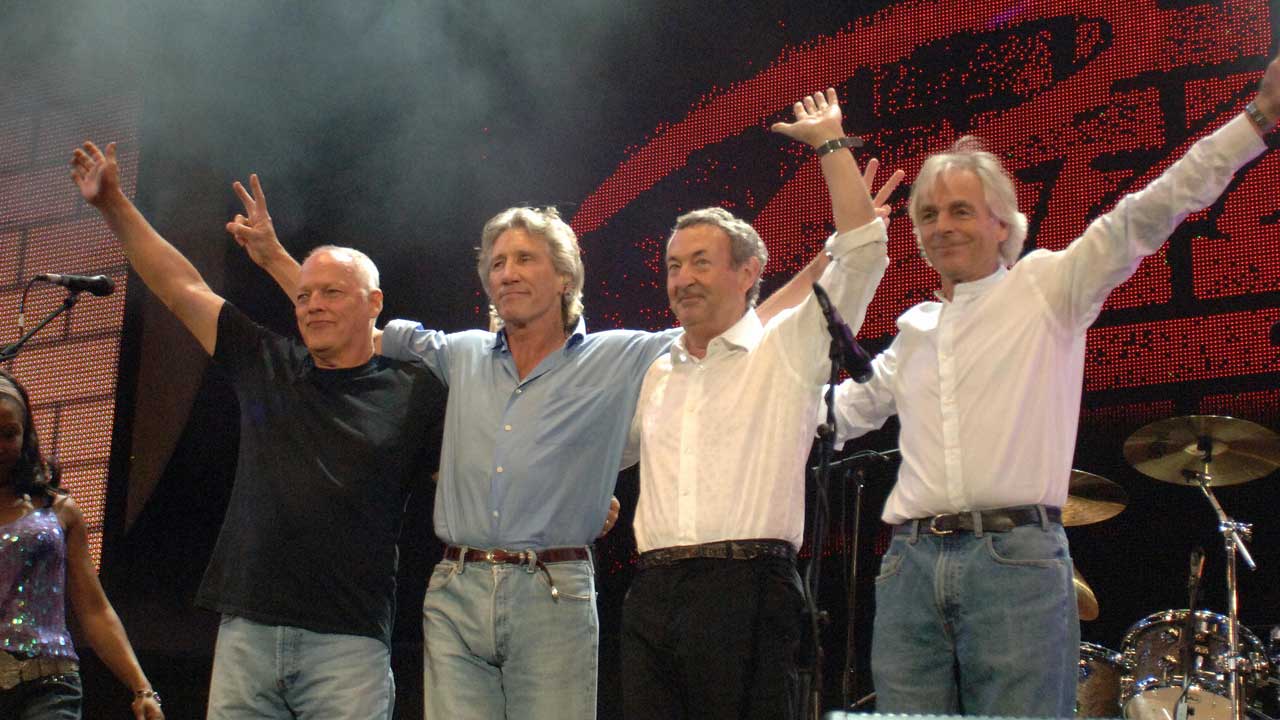
On 2 July 2005, Roger Waters, David Gilmour, Nick Mason and Rick Wright performed together as Pink Floyd for the first time in more than 24 years, at the Live 8/Make Poverty History concert in London’s Hyde Park. Organised by Bob Geldof, and watched by an estimated three billion people worldwide, the London event was just one in a series of concerts held around the globe in Philadelphia, Paris, Berlin, Rome and elsewhere.
However, when Geldof began planning Live 8, he never imagined Pink Floyd taking part. When he did eventually approach them, it was a major task to convince the classic 70s line-up to put aside their bitter disputes and re-unite for what would prove to be the last time ever.

Bernard Doherty (Live 8 publicist): I had done the PR for Live Aid in 1985, so I had a good long-standing relationship with Bob Geldof. Early in 2005, I had meetings at which I learned Bob was planning a concert, which was much more of an agit-prop kind of thing, and he asked me to handle all the PR for it.
I remember Bob saying he wanted to use the line, “It was twenty years ago today” from Sgt. Pepper, and he was getting Paul McCartney and U2 to open the event with that song. Pink Floyd were not involved at that point. In early May, Geldof placed a call to David Gilmour inviting him to re-convene Pink Floyd for Live8.
David Gilmour: Geldof rang and asked if I would do Live 8 with Pink Floyd. He didn’t mention Roger, he just said, “Will you put Pink Floyd back together to do fuckin’ Live 8?” I said, “No. I’m in the middle of my solo album.” He said, “I’ll come down and see yer,” and jumped on a train. I thought, “No, no, no.”. When I rang him on his mobile he was at East Croydon. I said, “Bob, there’s no point, get off the train.” He said, “I’m coming down anyway.”
Bob Geldof: I went down to his farm, tried to take him through it.
David Gilmour: He arrived and explained the whole thing to me in detail which made me feel a bit guiltier, but I was hanging on to my selfishness. I said, “You’ve got enough great people, you don’t need us”. But he wanted us.
Sign up below to get the latest from Classic Rock, plus exclusive special offers, direct to your inbox!
Bob Geldof: I could see he felt awful for saying, “No”. But he was gonna say, “No”. And he said, “I don’t know, man, I…” I said, “Don’t say, ‘No’… Drive me to the station, think about it.” He said, “But you know I’m going to say, ‘No’.” And I said, “Don’t say, ‘No’ before you think about it, and promise me you’ll think about it.”
Geldof next rang Nick Mason, who then called Roger Waters.
Nick Mason: He [Geldof] was looking for a real novelty act, to re-constitute this particular line-up of this particular band. I think it was a great idea. He started with David and gradually worked his way round. I think he was probably as surprised as we were.
Andrew Zweck (Roger Waters’ booking agent): Bob Geldof and Roger had had a relationship for years. Geldof had been in The Wall movie, and Roger was up for Live 8. He wanted to do it.
Roger Waters: I was the one who immediately promised to play on Live 8. Dave had first said, “No” to Bob Geldof.
Bob Geldof: Then Waters called me and he wanted to know what happened with the Gilmour conversation. I told him and he said, “Can I have David’s number?” I said, ‘OK’. Why don’t you have it?… But here it is.”
David Gilmour: He [Geldof] managed to connive with Nick to get Roger and he got Roger to ring me. My mobile rang and it was, “Hi this is Roger, how about it?” It was… surprising.
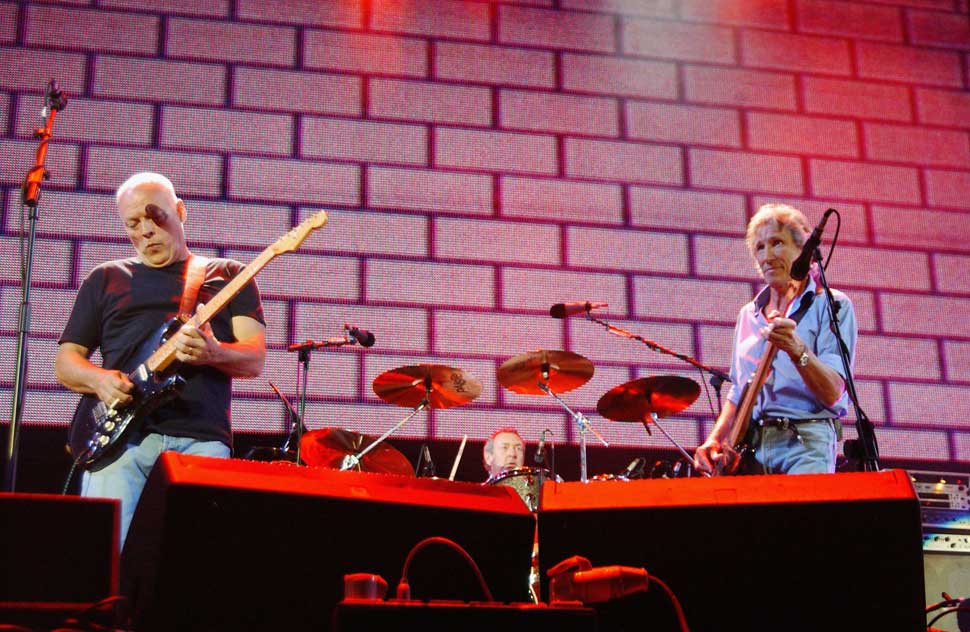
Having been persuaded to participate by Waters, Gilmour then asked Rick Wright. Then, at Floyd’s sometime touring guitarist Tim Renwick’s wedding reception later in May, Gilmour told him to put a date in his diary for Live 8, but denied that the band will be playing it.
Tim Renwick: At the time David said, “Oh Live 8’s going to be June 6, put it in your diary.” I said, “Oh, are you doing it?” He said, “No, we’re definitely not doing it, just to let you know if you wanted to keep that date free…”
Two weeks later, Gilmour called Renwick and confirmed that Pink Floyd would be playing at Live 8 and could he join them as a second guitarist.
Tim Renwick: Dave was laughing. He said, “We’re doing it now, and we’re doing it with Roger”. I was completely gobsmacked, as I’d never imagined it. But I always thought it was wrong that Roger left and they never played together again. David said, “It will be a real laugh…” But, of course, the thing was, it wasn’t a laugh at all.
While at the Download festival on June 10, agent Andrew Zweck and publicist Bernard Doherty learned that Pink Floyd would play Live 8.
Andrew Zweck: I was at Download on the Friday afternoon and my mobile rang and Mark Fenwick [Waters’ manager] said, “It’s all go, the reunion is on. First thing Monday we’re gonna get it all organised, get the band, the rehearsal room, put it all together, it’ll be off and running Monday…”
Bernard Doherty: Bob called my mobile to tell me he’d got Pink Floyd while I was on the motorway heading for the Download Festival. As soon as I got there, I gathered all the media in the media centre and announced that Pink Floyd was re-forming for Live 8. They all ran to their computers and started banging away. It was live on Radio One within a couple of minutes. Then Bob rang again and said, “You haven’t told the media yet, have you?” He’d promised David Gilmour that he could make the announcement exclusively on his website.
Up until then, artists like Madonna and U2 were people you might expect to be at a Bob Geldof event of this type. But, suddenly, because Pink Floyd were on the bill, there was another 100 media people wanting tickets.
The official announcement of the Pink Floyd reunion appeared on David Gilmour’s website on June 12.
David Gilmour: I want to do everything I can to persuade the G-8 leaders to make huge commitments to the relief of poverty and increased aid to the third world. It’s crazy that America gives such a paltry percentage of its GNP to the starving nations. Any squabbles Roger and the band have had in the past are so petty in this context, and if re-forming for this concert will help focus attention then it’s going to be worthwhile.
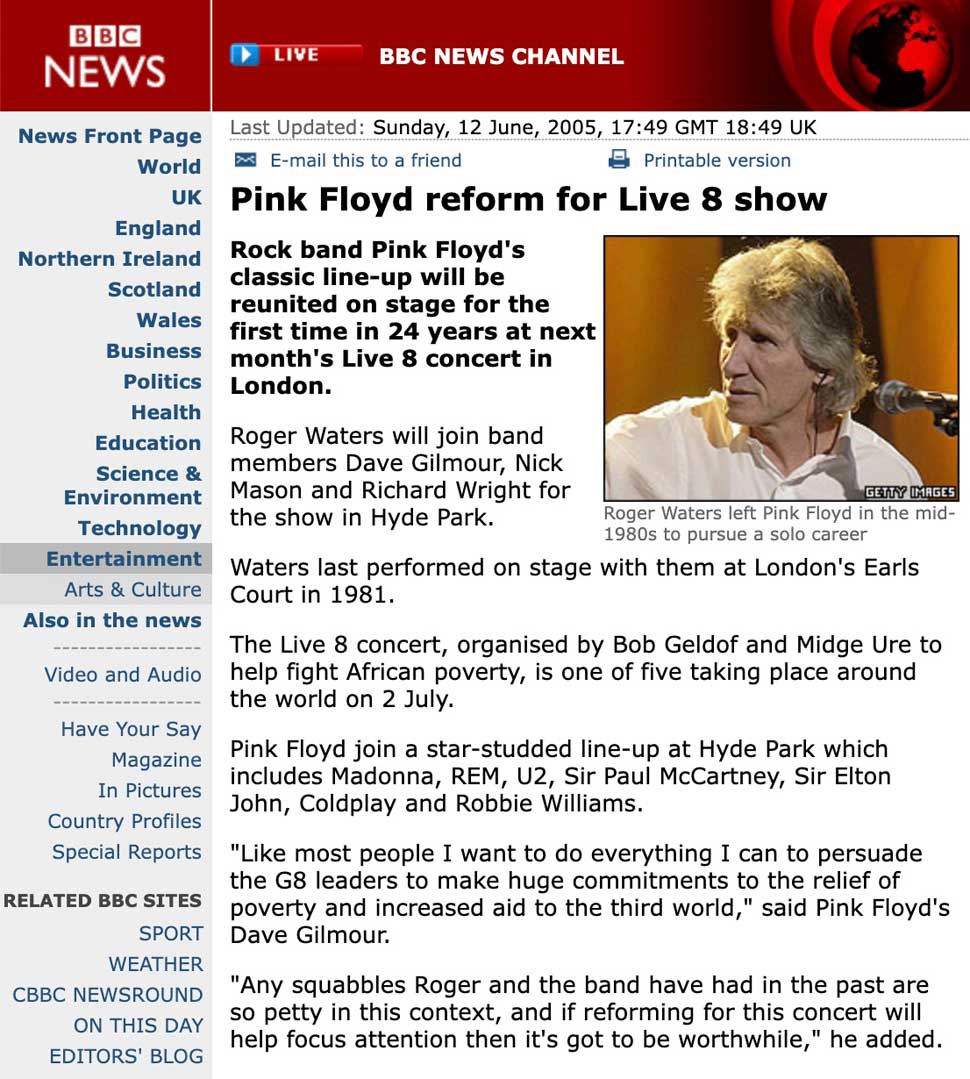
Immediately after the announcement, planning meetings began at London’s Connaught Hotel.
David Gilmour: Roger wanted to do Another Brick Tn The Wall, but I didn’t think it was appropriate. This was a thing for Africa and I didn’t really think that little children in Africa should be singing, ‘We don’t need no education’. There was no argument about it. I was absolutely right.
On June 15, it was reported that Syd Barrett is not interested in taking part in Floyd’s Live 8 reunion.
Rosemary Breen (Syd Barrett’s sister): I saw him this morning and told him the news, but he did not react. That is another life for him, another world in another time. He is not Syd anymore, he is Roger [his birth name]. There is no contact and he does not want them to get in touch with him.
Roger Waters: He has to lead a calm, stressless life. Each time that someone utters the words ‘Pink Floyd’ he becomes restless - he still does. We played with the idea of asking him for Live 8, but that did not appear feasible.
Three days of rehearsals began on June 28 at West London’s Black Island studios.
Jill Furmanovsky (photographer): I was there when they were rehearsing for it and it was the first time that David and Roger had communicated and played together since the big break-up. So, yeah, when they went into rehearsal for Live 8, suddenly the great power of the music took over and the animosity seemed to disappear, for at least that period of time. It was amazing.
Roger Waters: It was such fun. We went in and did some rehearsals, and the moment we plugged in for the first rehearsal, it was like putting on an old shoe.
Tim Renwick: Roger was at least an hour late turning up each day. He would arrive with this attitude of, “Right, I’m here now, we can begin”, which is what he used to do years ago. It’s a stunt, and he’d be making wild suggestions about rearranging things, because with his band he’d done things at different tempos and so on, and keys. David, bless him, was very accommodating, but at the end of the day he had to turn around and say, “Look, we’re doing four numbers and, at the end of the day, people are expecting to hear the hits exactly the way they sounded in the old days”.
There wasn’t a single person in the room that Roger hadn’t upset at some point in his career. So there was a lot of people standing around, looking very tight-lipped, being incredibly professional and keeping their heads down slightly, and doing what they were told. It should have been a real laugh and it wasn’t, in the final analysis, because Roger was still so hung up on trying to do it all his way.
David Gilmour: The rehearsals convinced me it wasn’t something I wanted to be doing a lot of.
One final rehearsal took place on July 1 in Hyde Park.
Andrew Zweck: On the Friday night, we kept getting messages that Madonna’s rehearsal was running later and later, and Hyde Park was closing at 11.00pm. In the end, we were left with just half an hour, and they ran out there, onto the actual Live 8 stage and played the songs.
There was about 25 workers in high-vis jackets putting the barrier up at the front, and they all just stopped and stared and went into raucous applause at the end. That was when we all knew we were onto a winner. The feeling on Friday night was very special. They all felt it. As they came off they were all, like, walking on air.
After that, all four of Pink Floyd and their wives went out for dinner together.
Live 8 took place in Hyde Park, London, on July 2, opened by Paul McCartney and U2 performing Sgt. Pepper’s Lonely Hearts Club Band, followed by, among others, Coldplay, Dido, Keane, Elton John, Annie Lennox, Madonna, Robbie Williams, U2, REM and Snow Patrol, before Pink Floyd took the stage as the penultimate act of the night.
Tim Renwick: We were supposed to play at 7.30, 8pm, and all that hanging about was awful. Backstage, all these people you hadn’t seen in ages, and you’re not eating and drinking, and then you hear it’s been put back for another hour.
Jon Carin (Pink Floyd’s additional keyboard player): It was a major star fest backstage, without an utterance of Africa or poverty. Lots of people pointing and staring at Brad Pitt etc… I hope it did some good somewhere.
Andrew Zweck: It had been a very long day. Backstage was a zoo, lots of famous faces and photos being taken and Paul McCartney marching around with a camera crew, but there was a great spirit and atmosphere, which is something Geldof always engenders.
Bernard Doherty: Even though it was a Make Poverty History benefit event, a lot of acts were making demands on ownership of video footage and photographs, and all that nonsense you get with major acts. Pink Floyd, on the other hand, made absolutely no demands of any sort. They turned up, plugged in, played their set and went.
Andrew Zweck: There were no visible tensions in the band, they all went for it in the spirit of the event.
Roger Waters (onstage): It’s actually quite emotional, standing up here with these three guys after all these years, standing to be counted with the rest of you. Anyway, we’re doing this for everyone who’s not here, and particularly of course for Syd.
Bernard Doherty: Unfortunately, I missed most of the Floyd’s set because I’d arranged for a photographer to go up in a helicopter and get an aerial shot, which Bob wanted as a front cover image for all the newspapers. But when the photographer got to the helipad, they wouldn’t let him on because they already had their full complement of media people.
I had to threaten the guy in charge that I would get Geldof on the phone to him. I was walking over to Bob, who had his daughters with him, and I was about give the phone over to him when the helicopter guy conceded. Then I was just able to dash over to catch the Floyd doing Comfortably Numb. They were amazing. It wasn’t like one of those supergroup jams with everybody on autopilot. I got a lovely hug from Roger Waters and David Gilmour.
David Gilmour: We got there and did it… pretty well, I think. It was great to feel how that felt on that occasion with Roger there. Hatred and bitterness are very negative things, it felt very good to have put all that into perspective and rounded it off nicely.
Rick Wright: Because of all the arguments and issues that Roger had with me, and with David, it was wonderful that we actually got up there and did it together. But we did learn something. It would be very hard for the four of us to go and do a world tour, simply because our ideas are so different musically.
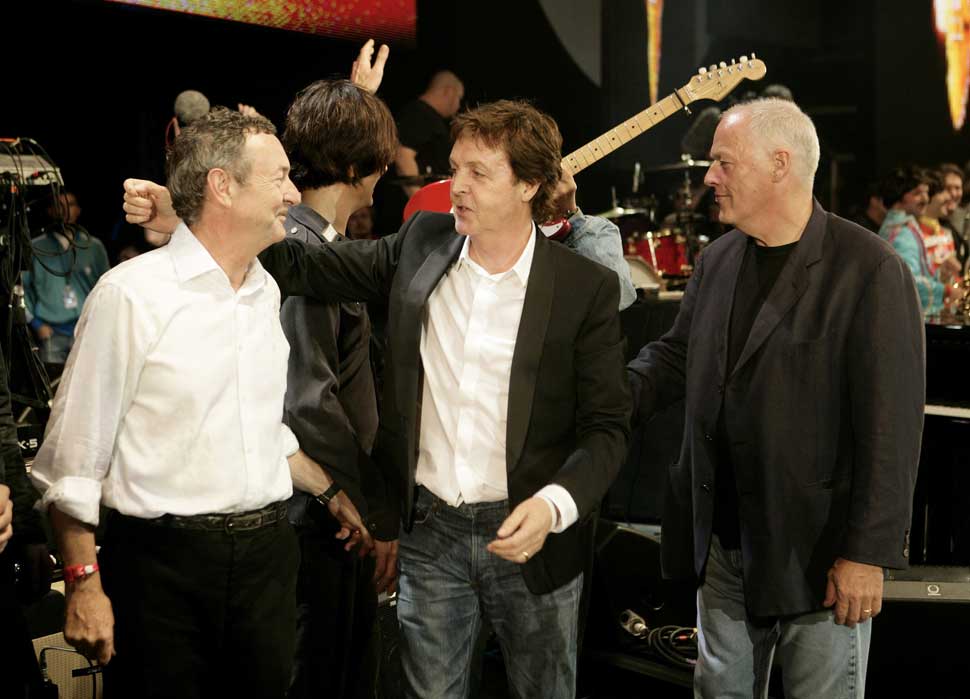
On July 4, HMV reported that sales of Pink Floyd albums had increased 13-fold since Live 8. Gilmour stated that he would donate all royalties from the rise in Floyd album sales to charity, and encouraged other artists on the Live 8 bill to do likewise.
Dave Gilmour: It’s a powerful thing, this old Pink Floyd business. Look at all the stories that followed Live 8 - Will they get back together? Will they tour together? It’s all so mysterious.
Roger Waters: They offered us $150m for a world tour, but I’m not in the mood.
Live 8 was the last time that a complete four-man line-up of Pink Floyd would ever play together. Original guitarist/songwriter Syd Barrett died on 7 July, 2006, and keyboardist Rick Wright on 15 September 2008.
Waters and Gilmour briefly re-united for a Hoping Foundation Gig in 2010, and Gilmour and Mason joined Waters for his Wall concert at London’s O2 Arena in 2011. However, all seem united in their conviction that a large-scale Pink Floyd comeback is not on the cards.
Nick Mason: We have no plans. I love touring but Dave’s not at all keen.
Roger Waters: A reunion is out of the question.
David Gilmour: The Live 8 thing was great, but it was closure. It was like sleeping with your ex-wife. There’s no future for Pink Floyd.
Johnny is a music journalist, author and archivist of forty years experience. In the UK alone, he has written for Smash Hits, Q, Mojo, The Sunday Times, Radio Times, Classic Rock, HiFi News and more. His website Musicdayz is the world’s largest archive of fully searchable chronologically-organised rock music facts, often enhanced by features about those facts. He has interviewed three of the four Beatles, all of Abba and been nursed through a bad attack of food poisoning on a tour bus in South America by Robert Smith of The Cure.
